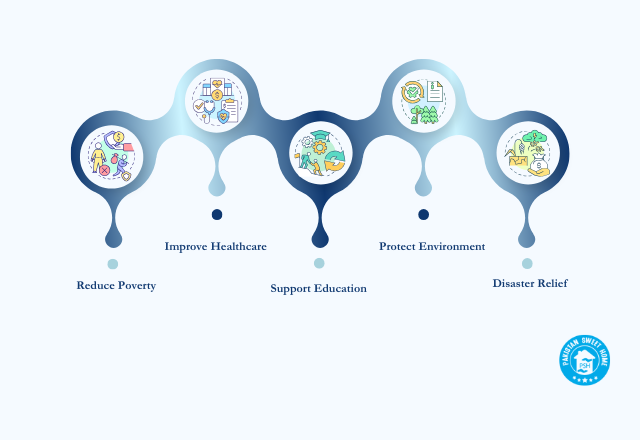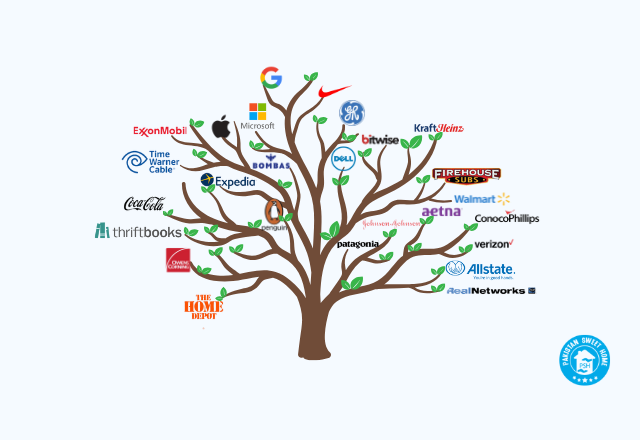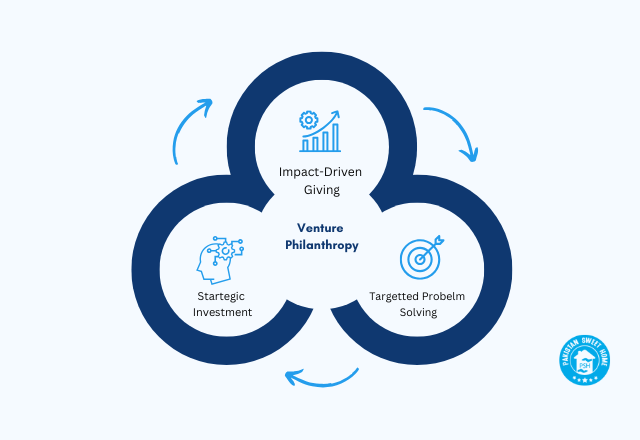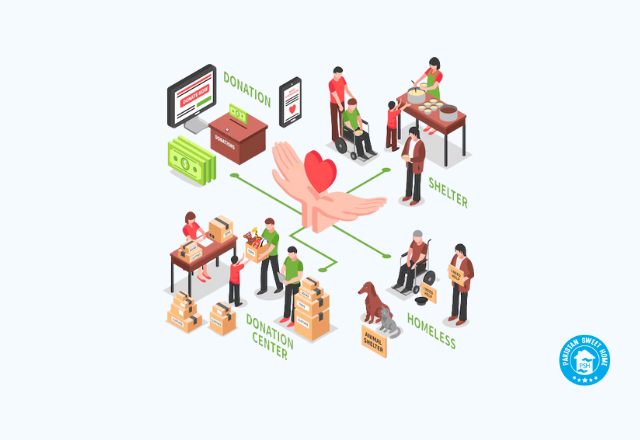Nonprofits often struggle to secure steady funding, relying on unpredictable donations and grants to operate.
Without a steady stream of support, planning for long-term growth and creating lasting impact is challenging. This uncertainty can hinder a nonprofit’s ability to make a real difference in the community.
Corporate philanthropy, a specific type of philanthropy, helps nonprofits secure steady funding while fostering strong connections with businesses. These partnerships provide the money they need to grow and help more people, making them important for long-term success.
Now, let's dive into the details of corporate philanthropy.
What is Corporate Philanthropy?
Corporate philanthropy is also known as business philanthropy and company philanthropy.
Corporate philanthropy includes the initiatives businesses undertake to support nonprofits and other ways of charity. These contributions can be money, free products or services, volunteer work, or free expert help. The goal is to create a positive societal impact while benefiting the nonprofit and the corporation.
For instance, a company might donate funds for a nonprofit’s annual campaign or provide technical expertise for a project. Corporate philanthropy connects businesses and nonprofits to work together for a better cause.
Types of Corporate Philanthropy
Corporate philanthropy takes many forms, offering unique opportunities for nonprofits to benefit.
Here are the most common types:
1. Matching Gifts
Matching gifts lets companies double or even triple their employees' donations to nonprofits. This increases the impact without costing the donor extra.
Employees check eligibility and submit forms, and the company matches the donation. Programs vary in how much they match, which nonprofits qualify, and when they end, making them a helpful tool for corporate giving.
2. Volunteer Grants
Volunteer grants, also known as Dollars for Doers, convert volunteer hours into donations. Companies donate based on hours volunteered, with options like per-hour rates or team grants. NGOs benefit from volunteer hours while receiving financial support tied to these efforts.
3. Corporate Grants
Companies support specific nonprofit projects by giving corporate grants. Nonprofits need to submit detailed proposals to apply for these grants.
The funds must be used as outlined, and nonprofits report on the impact to foster ongoing relationships. Grants are ideal for focused philanthropic initiatives.
4. Employee Grant Stipends
Employee grant stipends allow workers to choose nonprofits they want to donate to, helping them give to causes they care about. These stipends are added to workers' pay and allow companies to support various causes through their employees.
5. Automatic Payroll Deductions
Payroll deductions make it easier for employees to donate part of their salary to charities. Companies may set rules for which organizations can receive donations, making it a simple and regular way to give.
6. Corporate Volunteer Programs
Corporate volunteer programs help employees work with nonprofits to give back to the community. Employees use their company skills, like graphic design or event planning, to help. These programs foster teamwork and allow nonprofits to benefit from specialized expertise.
7. Volunteer Time Off (VTO)
VTO provides paid time for employees to volunteer, encouraging a culture of giving. VTO, which gives employees 8 to 40 hours a year to volunteer, helps nonprofits and boosts employee happiness and teamwork.
8. In-Kind Donations
In-kind donations are when people or companies give things instead of money. This could include donating equipment or offering services to help. Nonprofits save time and money, and companies can give what is needed most.
9. Scholarships
Companies support education by funding scholarships for students or working with nonprofits to run programs. Scholarships demonstrate a commitment to fostering future talent and supporting educational advancement.
10. Sponsorships
Through sponsorships, companies fund nonprofit activities. In return, they receive a public acknowledgment, like event mentions or branded materials. This partnership benefits both parties by combining financial support with marketing exposure.
11. Cause-Related Marketing (CRM)
CRM connects companies with nonprofit causes. It creates marketing campaigns that promote both the cause and the company’s products. Effective CRM initiatives inspire audiences to support the cause through donations or participation.
12. Annual Giving
Annual giving campaigns encourage employees to donate during specific times of the year, often around the holidays. Companies may tie these campaigns to community events like GivingTuesday, reaping the benefits of charity.
13. Employee Product Donation Programs (EPDP)
EPDPs enable employees to donate discounted company products to nonprofits. This approach combines employee generosity with corporate resources. It helps increase the impact on charitable organizations.
Benefits of Corporate Philanthropy
Corporate philanthropy is good for businesses and nonprofits, creating a win-win situation for everyone.
Let’s explore how both sides benefit:
Benefits for Nonprofits
Here are the benefits of Corporate philanthropy for Nonprofits:
- Increased Funding
Corporate sponsors give money or valuable goods to support things like events and campaigns. This ensures nonprofits have the resources needed to achieve their goals.
- Broader Marketing Reach
When businesses tell employees about nonprofits, they help connect nonprofits with new people. This expands the nonprofit's supporter base and boosts brand recognition.
- Long-term Partnerships
Corporate partnerships often provide ongoing support, offering a stable and reliable funding source. These relationships can become cornerstones for nonprofit sustainability.
- Access to Expertise
Many corporations offer pro bono services or volunteer programs. These provide nonprofits with access to professional insights and skills. This can enhance operations without straining budgets.
Benefits for Businesses
Here are the benefits of Corporate philanthropy for businesses:
- Employee Engagement
Corporate philanthropy boosts morale and fosters loyalty among employees. Workers are more likely to stay with companies that align with their values and support the causes they care about.
- Enhanced Reputation
Supporting various types of NGOs or nonprofits enhances a company's public image, demonstrating a commitment to social good. This can lead to increased customer trust and loyalty.
- Expanded Customer Base:
Partnering with nonprofits helps businesses reach new audiences. It also allows them to show shared values, creating opportunities to gain loyal customers.
- Tax Benefits
Charitable donations provide businesses with valuable tax incentives. This helps reduce financial burdens while supporting social causes.
Benefits for Employees
Here are the benefits of Corporate philanthropy for employees:
- Improved Job Satisfaction
Employees feel a sense of purpose when their company contributes to meaningful causes. This leads to higher job satisfaction and a stronger connection to their workplace.
- Skill Development
Engaging in volunteer programs or pro bono work allows employees to refine skills like teamwork, leadership, and problem-solving. This benefits both their personal and professional growth.
- Enhanced Well-Being
Participating in charitable activities can boost employee morale and mental health. It helps create a positive work environment and reduce stress.
- Stronger Workplace Culture
Philanthropy initiatives create opportunities for employees to bond over shared values and causes. This helps cultivate a collaborative and inclusive company culture.
- Opportunities for Recognition
Companies often highlight employee contributions in philanthropy efforts. They offer recognition and celebrate their employees' efforts to give back to the community.
- Sense of Pride
Employees feel proud to work for a socially responsible organization. This boosts their loyalty and commitment to the company.
Effective Corporate Philanthropy Examples
Let’s explore how successful corporations use philanthropy to create an impact.
Here are some examples of corporate philanthropy:
Google
Google is a leader in corporate philanthropy, donating $1 billion in grants and 1 million volunteer hours over five years. It also matches up to $10,000 in employee donations annually. Additionally, Google has an Ad Grant program. It provides eligible nonprofits with $10,000 in monthly ad credits to boost their outreach.
Coca-Cola
Coca-Cola helps communities by supporting women’s economic growth, youth education, and providing clean water. They also have a matching gift program, where they match up to $20,000 per employee each year at a 2:1 ratio, encouraging employees to get involved in giving.
Boeing
Boeing contributes over $60 million every year in charitable grants. It does this through its Employee Community Fund, one of the biggest programs led by employees to give grants.
The company matches employee donations up to $10,000 at a 1:1 ratio and offers $100 volunteer grants for every 10 hours of community service.
General Electric (GE)
GE’s corporate philanthropy focuses on making a positive impact worldwide. It is known for its popular employee matching gift program. Beyond financial support, GE encourages volunteerism and community service to strengthen societal impact.
Danaher Corporation
Danaher matches employee donations to causes, especially those focused on health and research, which align with its mission. These efforts foster a culture of consistent giving among its workforce.
Deloitte
Deloitte simplifies employee philanthropy through innovative technology. Its auto-submission feature streamlines the process, empowering employees to support causes effortlessly. The company enables easy donation matches up to $7,500 per year.
Soros Fund Management
Soros Fund Management has a very generous matching gift program, where they match up to $100,000 per employee each year. They also encourage volunteering by giving charity and supporting various causes like human rights, education, and social justice.
Corporate Philanthropy Statistics
Corporate philanthropy sounds promising, but does it work in practice? Here’s a look at the numbers:
Prevalence of Corporate Philanthropy Programs
- 65% of Fortune 500 companies offer matching gift programs. (Source: Double the Donation)
- 28% of employers provide paid leave for volunteering increasing annually. (Source: The Society for Human Resource Management)
Impact on Nonprofits
- Corporate giving to nonprofits rose from 2022 to 2023. (Source: Double the Donation)
- The top 10 corporations donate over $2 billion annually through employee matching gifts. (Source: Double the Donation)
Impact on Companies
- 71% of employees value working for companies that support giving and volunteering. (Source: America’s Charities)
- Companies involved in philanthropy experience 57% lower employee turnover. (Source: Benevity)
7 Tips to Raise More Through Corporate Philanthropy
Maximizing corporate partnerships requires strategy and effort. Here are practical tips to get started:
- Target Like-Minded Businesses: Partner with companies that have the same values as your nonprofit to build strong and impactful collaborations.
- Promote Matching Gifts: Educate donors about matching gift programs to encourage participation and amplify their contributions.
- Leverage Technology: Use tools like CRM software to track corporate donations and streamline partnership management.
- Host Corporate Engagement Events: Encourage companies to join events or volunteer activities, helping them connect more with your cause.
- Showcase Impact: Highlight how corporate contributions make a difference through reports, testimonials, and public acknowledgments.
- Provide Customization Options: Create partnership options that match the company's goals and values.
- Build Long-Term Relationships: Build long-lasting partnerships by keeping in touch and regularly showing appreciation for the help companies give.
In conclusion, Corporate philanthropy is more than just a trend—it's a powerful strategy that benefits both businesses and the communities they serve. Companies can enhance their reputation, boost employee morale, and create lasting social change by engaging in meaningful giving.
With the right approach, businesses can not only contribute to a cause but also build stronger relationships with customers, employees, and nonprofit organizations. Whether through matching gift programs, volunteer opportunities, or strategic donations, corporate philanthropy offers a win-win scenario.
If you're looking to make a difference, embracing corporate philanthropy is a step towards a better future for all.
The orphanage center, like Pakistan Sweet Home, offers more than just shelter—it provides a nurturing space where children receive education, care, and emotional support. Every child is guided with love and empowered to grow into a confident, capable individual. These centers are the heart of our mission, where broken beginnings are transformed into bright futures.
Support an Orphan’s Journey

info@pakistansweethome.org.pk
(051) 4865856
+92 335 1118477












